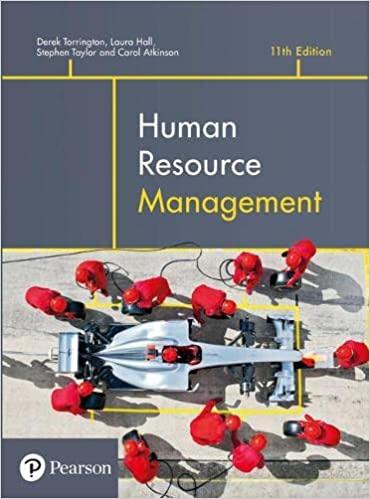You work in the HR department of a large corporation which operates a well-known chain of fashion
Question:
You work in the HR department of a large corporation which operates a well-known chain of fashion stores (Large Co). Your company has outlets on the high streets of all the major UK cities and is steadily increasing its presence in out-of-town shopping complexes and airports.
In addition, recent years have seen the start of what is intended to be a major expansion overseas with the opening of new flagship stores in a number of European cities. International online sales are also growing rapidly.
As part of its overseas expansion plans, a few weeks ago, your company took over another organisation (Small Co) which operates three high street fashion outlets in South East Asian cities and also supplies garments to a range of retailers in the UK from its factories. It employs around 400 people in India, Pakistan and Bangladesh. You have been seconded for a year to work at Small Co which has not to date ever employed a professionally qualified HR manager.
Soon after your arrival at Small Co, you become aware of various management practices which you are uneasy about and which are very different indeed from what you are used to at Large Co.
Pay rates, for example, do not appear to be established using any rational system. Its staff are appointed at a variety of rates according to what they were able to negotiate when they start working for the company. There are also a good number of junior managerial staff who are working in excess of 60 hours each week. Trade union membership is actively discouraged, while training and development opportunities are minimal. There is no formal induction provided and no staff handbook. Health and safety procedures appear to be minimal. Staff turnover is running at 35%. You are even more concerned when you visit some of the stores and garment factories that Small Co operates in Asia. Here pay is very low and hours of work are long. The more senior posts all seem to be held by male relatives of top managers (all themselves men), while people seem to be hired and fired on a whim. While the managers you meet deny bullying their staff, this is not what the staff themselves say to you when you speak to them confidentially. Moreover, while it is denied that anyone under the age of 15 is employed, some staff look to you to be considerably younger. You are also concerned to observe that water contaminated with dyes and fixing agents appears to be being channelled directly into a river behind one of the factories you visit.
You are taken aback by what you observe in your first few weeks at Small Co. You are used to working in Large Co with its big HR division, range of ‘good practice’ employment policies and prominent corporate code of ethics. None of this exists at Small Co and there is no sign at all that any kind of ethical culture has been developed. It is, however, a very profitable business.
Questions
1. What are the main strands of the business case you could make in support of the introduction across Small Co’s operations, as a matter of priority, an ethical culture alongside ethically sound HR policies and practices? What counter-arguments might you expect to have to answer?
2. To what extent might the differences in the way HR is practised in Large Co and Small Co operations be explained by cultural or institutional factors?
Step by Step Answer:

Human Resource Management
ISBN: 9781292261645
11th Edition
Authors: Derek Torrington, Laura Hall, Stephen Taylor, Carol Atkinson





